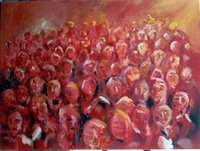The one who stands alone
 Hey!
Hey!So, tonight, I went to yet another play. I had read a review of this one and it was very good, so I thought I'd give it a try, even though it was far, faaar away.
The play is called "An enemy of the people", and was written by Henrik I bsen, a norwegian writer, in 1882. It is the story of a doctor- amazingly enough, for those who lived in Finland, the doctor's name is Stockmann!! But ok, not the point. The doctor finds that the thermal baths, for which the city is widely known for and a that play a big part of the its economical survival, are infected and have to be closed down for repairs. At first, he has the press on his side (represented by 2 journalists and the financer of the newspaper that claims to be the voice of the people). Having the press, to him, means having the power.
bsen, a norwegian writer, in 1882. It is the story of a doctor- amazingly enough, for those who lived in Finland, the doctor's name is Stockmann!! But ok, not the point. The doctor finds that the thermal baths, for which the city is widely known for and a that play a big part of the its economical survival, are infected and have to be closed down for repairs. At first, he has the press on his side (represented by 2 journalists and the financer of the newspaper that claims to be the voice of the people). Having the press, to him, means having the power.
 bsen, a norwegian writer, in 1882. It is the story of a doctor- amazingly enough, for those who lived in Finland, the doctor's name is Stockmann!! But ok, not the point. The doctor finds that the thermal baths, for which the city is widely known for and a that play a big part of the its economical survival, are infected and have to be closed down for repairs. At first, he has the press on his side (represented by 2 journalists and the financer of the newspaper that claims to be the voice of the people). Having the press, to him, means having the power.
bsen, a norwegian writer, in 1882. It is the story of a doctor- amazingly enough, for those who lived in Finland, the doctor's name is Stockmann!! But ok, not the point. The doctor finds that the thermal baths, for which the city is widely known for and a that play a big part of the its economical survival, are infected and have to be closed down for repairs. At first, he has the press on his side (represented by 2 journalists and the financer of the newspaper that claims to be the voice of the people). Having the press, to him, means having the power. But, as the journalist in the play says, "we, journalists, a ren't worth anything". And the press changes sides when they find out how much that information will cost to the city and its people. Their obligation to the truth - which they fiercily claim in the beginning of the play - is soon forgotten, when they decide that their obligation to themselves and their own benefit is worth more than simply the truth. And like this, he goes from being the savior of the people to being the enemy of the people, and his voice is completely shut out by the government and the press.
ren't worth anything". And the press changes sides when they find out how much that information will cost to the city and its people. Their obligation to the truth - which they fiercily claim in the beginning of the play - is soon forgotten, when they decide that their obligation to themselves and their own benefit is worth more than simply the truth. And like this, he goes from being the savior of the people to being the enemy of the people, and his voice is completely shut out by the government and the press.
 ren't worth anything". And the press changes sides when they find out how much that information will cost to the city and its people. Their obligation to the truth - which they fiercily claim in the beginning of the play - is soon forgotten, when they decide that their obligation to themselves and their own benefit is worth more than simply the truth. And like this, he goes from being the savior of the people to being the enemy of the people, and his voice is completely shut out by the government and the press.
ren't worth anything". And the press changes sides when they find out how much that information will cost to the city and its people. Their obligation to the truth - which they fiercily claim in the beginning of the play - is soon forgotten, when they decide that their obligation to themselves and their own benefit is worth more than simply the truth. And like this, he goes from being the savior of the people to being the enemy of the people, and his voice is completely shut out by the government and the press. I have been going to a lot of plays, and I have been writing about all of them, so I had thought not to write about this one (and I won't write anything about the actors or anything like that, although they were indeed very good). But I just can't not write. The play is so honest, and so true, and even though it was written in 1882, the depiction of politics is still valid today, in Norway, in Brazil, wherever. Sometimes, you would just hear people laughing out loud in the audience, because they identified the lines just spoken with the speaches we hear everyday. "We are the voice of the people", they all claim.
 In the end (yes, I am telling the end of the play, if you don't wanna know, go away), the doctor is almost expelled from the city, his very few supporters lose their jobs, for defending the truth. For defending that every majority is stupid, and the situation we are in is because of this stupid majority rule. Majorities don't think, he says, they don't know, they don't see. They just follow, and think of their own interests, usually in the short term. And after all this, he still believes. He doesn't bend, he doesn't give in to the stupidity of the majority or the betrail of the press. His last words in the play are "I have to say this in a very low voice, because most people still must discover this for themselves. The strongest man is the one who stands alone". If this sentence alone doesn't justify the existence of this post, I can't.
In the end (yes, I am telling the end of the play, if you don't wanna know, go away), the doctor is almost expelled from the city, his very few supporters lose their jobs, for defending the truth. For defending that every majority is stupid, and the situation we are in is because of this stupid majority rule. Majorities don't think, he says, they don't know, they don't see. They just follow, and think of their own interests, usually in the short term. And after all this, he still believes. He doesn't bend, he doesn't give in to the stupidity of the majority or the betrail of the press. His last words in the play are "I have to say this in a very low voice, because most people still must discover this for themselves. The strongest man is the one who stands alone". If this sentence alone doesn't justify the existence of this post, I can't.that's it, loves. beijos
painting by Pedro Charters, "multidão 2".


0 Comments:
Post a Comment
<< Home